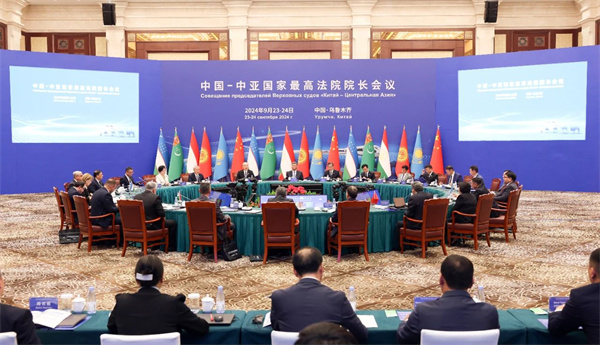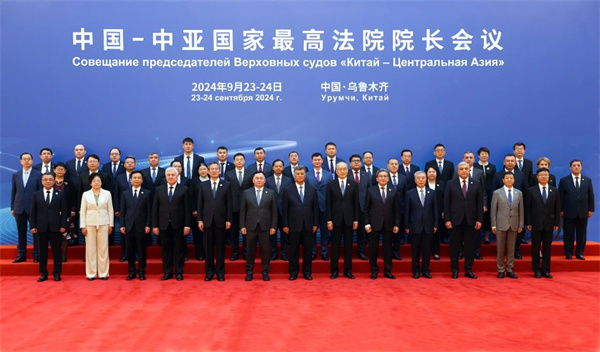Meeting of presidents of Supreme Courts of China and Central Asian countries held in Xinjiang
The Meeting of Presidents of Supreme Courts of China and Central Asian Countries opened in Urumqi, capital city of Northwest China's Xinjiang Uygur autonomous region, on Sept 24.
Ma Xingrui, member of the Political Bureau of the Central Committee of the Communist Party of China (CPC) and secretary of the CPC Xinjiang Uygur Autonomous Regional Committee, addressed the opening ceremony, while Zhang Jun, president of the Supreme People's Court of China, delivered a keynote speech.

The Meeting of Presidents of Supreme Courts of China and Central Asian Countries opens in Urumqi, capital city of Northwest China’s Xinjiang Uygur autonomous region, on Sept 24. [Photo/court.gov.cn]
Ma lauded the joint efforts of China and Central Asian countries in promoting the comprehensive revival of the Silk Road, which, he said, have ushered in a new era of bilateral relations.
Noting that advancing Belt and Road cooperation requires rule of law safeguards, he said the meeting would enhance judicial exchanges and cooperation between countries, and collectively address various challenges, combat crime and foster a more harmonious and peaceful environment in the region.
Xinjiang has expanded its high-level opening-up in recent years, Ma said, adding that the region has earnestly implemented the outcomes of the China-Central Asia Summit, which was held in Xi’an, capital of Northwest China's Shaanxi province, in May last year, deepened practical cooperation with the five Central Asian countries in various fields, and actively facilitated the development of the "golden corridor" between Asia and Europe and the gateway for the opening-up of China's western region.
Xinjiang is committed to deepening law-based governance, speeding up efforts in building itself into a legal service area in the Silk Road Economic Belt and strengthening judicial exchanges and cooperation to ensure that high-quality law-based governance steers the long-term steady development of relations between China and Central Asian countries, he added.
In his remarks, Zhang said the rule of law is a crucial foundation and guarantee for sustainable Belt and Road cooperation. He called for strengthening pragmatic cooperation in adjudication enforcement, deepening exchanges and mutual learning in judicial practices, and expanding the outcomes of mutually beneficial cooperation.
In his keynote speech, Zhang reviewed judicial exchanges and cooperation between Chinese courts and those of Central Asian countries, and affirmed China's commitment to upholding strict and fair justice, enriching comprehensive cooperation between China and Central Asian countries through the rule of law and providing robust judicial safeguards for high-quality Belt and Road cooperation.
He said Chinese courts are willing to work with all parties to uphold the concept of common, comprehensive, cooperative and sustainable security, deepen judicial assistance cooperation in combating the "three evil forces” of terrorism, separatism and extremism, drug trafficking, transnational organized crime, cybercrime and other areas to effectively safeguard regional security and stability.
Zhang stressed the importance of adhering to the principles of extensive consultation, joint construction and shared benefits, using high-quality legal services to stabilize expectations, promote development and deliver benefits to public wellbeing, and strive to build a business environment governed by a sound legal framework.
He called for promoting ecological governance in the region and enhancing exchanges and mutual learning in the judicial protection of the ecological environment to injecting green energy into the development of China and Central Asian countries.
He also underlined the need to integrate technological innovation achievements with judicial work, strengthen the construction of IT-based, digital and intelligent courts, and contribute to the building of a higher-level "Digital Silk Road".
Presidents of the Supreme Courts of Kazakhstan, Kyrgyzstan, Tajikistan and Uzbekistan all spoke at the opening ceremony, while a judge from the Supreme Court of Turkmenistan delivered an online speech.

Participants at the Meeting of Presidents of Supreme Courts of China and Central Asian Countries pose for a group photo. [Photo/court.gov.cn]
Professionals in the judicial field from Kazakhstan, Kyrgyzstan, Tajikistan and Uzbekistan, as well as officials from the secretariat of China-Central Asia cooperation mechanism and relevant diplomatic envoys in China attended the opening ceremony.







